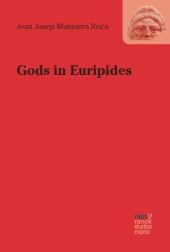 Neuerscheinungen 2015Stand: 2020-02-01 |
Schnellsuche
ISBN/Stichwort/Autor
|
Herderstra▀e 10
10625 Berlin
Tel.: 030 315 714 16
Fax 030 315 714 14
info@buchspektrum.de |

Joan J. Mussarra Roca
Gods in Euripides
Mit E-Book
1. Auflage. 2015. 236 S. 230 mm
Verlag/Jahr: NARR 2015
ISBN: 3-8233-6958-X (382336958X)
Neue ISBN: 978-3-8233-6958-5 (9783823369585)
Preis und Lieferzeit: Bitte klicken
This book is about the representation of gods (both as characters and as a subject for discourse) in two tragedies by Euripides: Heracles and Hippolytus. Its goal is to establish a framework for the reading of Greek tragedy and for the analysis of the various ways in which the gods of the Greek religion appear in tragic drama, and to apply it to the aforementioned plays.
In this work we contend that such a framework should transcend the usual dichotomy made between a "religious" and a "non-religious" reading of Greek tragedy, and more specifically of Euripidean tragedy. This dichotomy contains in itself a cultural assumption, that is, the possibility of establishing a clear-cut distinction between a domain of religious discourse and an autonomous, profane sphere in which the representations of gods would assume a different value and meaning. There is nothing in the discursive structures of Classical Greece that allows us to posit something of the kind. The elements that appear to us as questioning the traditional representations of gods in Greek tragedy can be seen from this perspective.
Preface
1 Poetry, epistemic shift, and the representations of gods
1.1. The process of epistemic shift
1.2. The relevance of poetry
1.3. The polycentric character of Greek cults
1.4. The Homeric-Hesiodic paradigm
1.5. The possibility of a Greek Enlightenment
2. The tragic genre
2.1. Tragedy in its context
2.2. Tragedy as spectacle
2.3. The megatext of tragedy
2.4. Modalities of discourse
2.5. Some specific cases
3 First exemplification: the Tragic Heracles
3.1. General questions
3.2. Heracles the character
3.3. The conflict surrounding the altar
3.4. The importance of "tyche"
3.5. The debate between Amphytrion and Lycus
3.6. Heracles┤ return
3.7. The catastrophe
3.8. A new ethical model
4 Second exemplification: the treatment of Hippolytus and Phaedra
4.1. Hippolytus and cult
4.2. The "philia" of man and goddess
4.3. Hippolytus┤ exceptional "physis"
4.4. Phaedra┤s rhesis
4.5. The transformation into cult figure
4.6. The gods
Bibliography
Index Locorum


